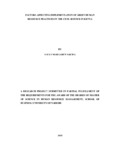| dc.contributor.author | Sakwa, Sally M | |
| dc.date.accessioned | 2019-01-30T09:20:32Z | |
| dc.date.available | 2019-01-30T09:20:32Z | |
| dc.date.issued | 2018 | |
| dc.identifier.uri | http://hdl.handle.net/11295/106021 | |
| dc.description.abstract | The main study’s main objective was to establish the factors affecting the implementation of green HRM practices in the civil service in Kenya. The study adopted a descriptive survey design to collect, analyze and present data. The target population was 40 HR directors working in the 21 Ministries. Because the target population was small, the researcher used census instead of sampling. Semi-structured questionnaire containing both closed and open ended questions were used for the collection of primary data. A pilot test was conducted to establish the validity and reliability of the questionnaire. Data was analyzed using both quantitiave and qualitative techniques using SPSS. The final data was presented using tables and figures.
The study found out that government policy has a positive correlation with success in the implementation of GHRM. There is no significant correlation coefficient of top management commitment and implementation indicating a weak relationship. The study also found out that there is a significant relationship between organization culture and implementation of green HRM practices. Similarly, there is a positive correlation between leadership and implementation of GHRM. Finally, the study established that there is a strong relationship between information system and implementation of GHRM.
The study recommends that the green HRM practices should be aligned with the government policy in relationship to a clean and safe working environment. A supportive environment should be created to enhance successful implementation of GHRM. The top managers should be involved in the implementation of green HRM practices from the very beginning. The management of public service organizations should create a culture of team work, effective communication and participation. The management of the public service organizations should adopt both participative leadership style and transformational leadership. The management should allocate enough resources to purchase new technologies that can help to eliminate paper work which facilitates the implementation of green HRM practices. | en_US |
| dc.language.iso | en | en_US |
| dc.publisher | university of nairobi | en_US |
| dc.rights | Attribution-NonCommercial-NoDerivs 3.0 United States | * |
| dc.rights.uri | http://creativecommons.org/licenses/by-nc-nd/3.0/us/ | * |
| dc.subject | Green Human Resource Practices | en_US |
| dc.title | Factors Affecting Implementation of Green Human Resource Practices in the Civil Service in Kenya | en_US |
| dc.type | Thesis | en_US |



